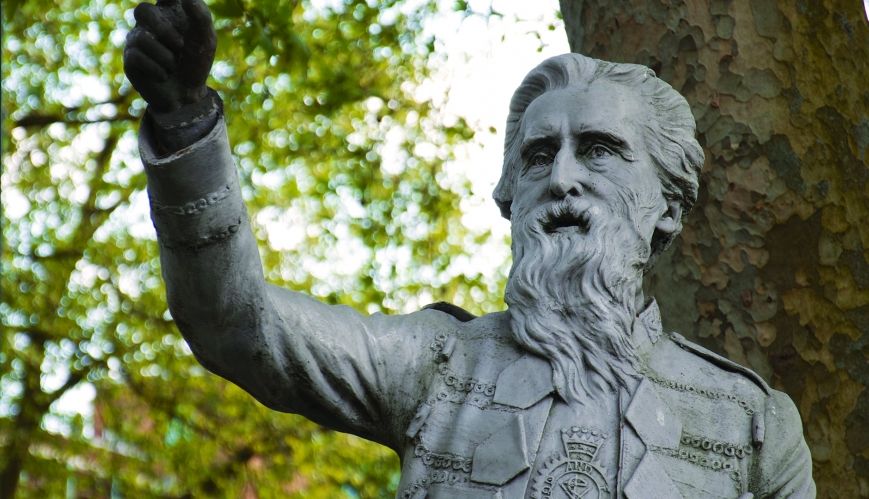The General takes command

The General takes command
The General William Booth statue in the East End of London where he pioneered a work which 150 years later is being carried on by more than one million Salvationists worldwide.
While the evolution from a Christian Mission to The Salvation Army had proceeded in a somewhat orderly fashion, the emergence of William Booth as its General caused him some disquiet. William Booth’s leadership of The Christian Mission gave him the status of General Superintendent, and he was often colloquially referred to as General. The move from the colloquial and informal nickname, to the General commanding an army was a significant and momentous transformation, one with which William Booth was somewhat uncomfortable.
Towards the end of 1878, the title “General William Booth” appeared on the organisation’s letterhead. On seeing the letterhead, William Booth was less than comfortable and returned the paper to his son Bramwell, who was his father’s right-hand man, with the comment: “Can’t this be altered? It looks too pretentious”.
If the General was struggling with his new designation, so was the organisation he led. An edition of the Christian Mission Magazine in September 1878 seems to also struggle with the new designation. In a report of the mission’s activities it stated that: “The Christian Mission had organised a salvation army,” all lower case. The phrase was more a description rather than that of a title. It was clear that neither William Booth nor his followers had yet comes to terms with the new title: The Salvation Army.
The increasing use of military terminology, however, was becoming evident, judging by that edition’s report on a “War Congress” held the previous month. At the direction of Bramwell Booth, one of the mission’s workers, William E. Ebdon, placed a huge sign over the platform on which he had painted in large letters: SALVATION ARMY. An army had begun to emerge and its General would soon take command.
At the War Congress, a legal document (called a deed poll) was adopted. The title, The Salvation Army, does not appear on the document but rather the old title, The Christian Mission, indicating that the organisation was still in a period of transition. The new name was legally added in June 1880. However, the deed poll clearly spelt out that the organisation was now under autocratic control: “The Christian Mission should be always thereafter under the oversight, direction and control of some one person who should be the General Superintendent. That William Booth should continue to be, for the term of his natural life, the General Superintendent of The Christian Mission.”
During the War Congress, William Booth delivered a number of addresses which are significant in their content and implication. He told his listeners: “We do not invite people to a conference as others do for the purpose of debating and legislation, because we take it that all here are in perfect harmony with us in purpose and design, for if they do not aim at the same thing and in the same way, they are not with us.” Later in the same address he went on to declare: “People who are not with me in purpose and plan must not complain that they do not have my confidence.” These are not the words of a bishop addressing a synod but rather the words of a general addressing his army.
Perhaps it was that these addresses at the 1878 War Congress were to set the foundation for the ethos of the movement that was becoming known as The Salvation Army, and in reading them we begin to understand the philosophy that was to undergird the organisation in the following years. The General went on to say: “We are sent to war. We are not sent to minister to a congregation or be content if we keep things going. We are sent to make war against the bulk of the people ... and to stop short of nothing but the subjugation of the world to the sway of the Lord Jesus”.
The General had taken control of his Army and laid down his battle plan. “The world for God” was not just a nice cliché for some starry-eyed dreamer but rather the battle cry of an Army on the march. No doubt when the General referred to “making war against the bulk of the people” he was acutely aware that there may well be battles to be fought against a fierce opposition, and the victory would require great planning, resourcefulness, effort and certainly great sacrifice.
William Booth, despite his position as the leader of a totally autocratic organisation, never seemed to become a demagogue or dictator. He certainly demanded a great deal from those who willingly chose to enlist in his Army, but he expected no more of his troops that he was willing to give himself. Around the end of 1878, it came to his notice that some officers, in order to wage the war, had come to the brink of starvation, which prompted him to issue a “General order against starvation”.
By the end of 1879, The Christian Mission Magazine changed its name to The Salvationist, and the new organisation’s goals were defined in an article by the General in that issue, in which he wrote: “We are a Salvation people – this is our specialty – getting saved and keeping saved and getting someone else saved.”
William Booth’s style of militaristic Christianity drew many to him and inspired a great sense of loyalty. Such a scenario today may well find accusations of fanaticism or extremism levelled against it. However, the reality of life is that no great progress is made either in the world or within the Christian movement without a great deal of passion, dedication and sacrifice, characteristics transparently obvious in our early Salvationists.